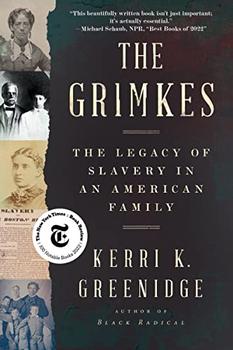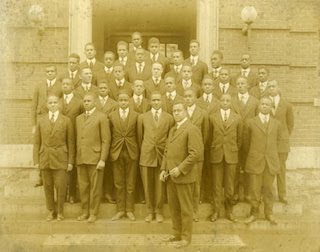Summary | Excerpt | Reviews | Beyond the Book | Read-Alikes | Genres & Themes | Author Bio

The Legacy of Slavery in an American Family
by Kerri K. GreenidgeThis article relates to The Grimkes
 Throughout The Grimkes: The Legacy of Slavery in an American Family, historian Kerri K. Greenidge repeatedly refers to the postbellum "colored elite" to which the Black Grimke family members belonged, using the term "the Talented Tenth." Made famous by the American sociologist and writer W. E. B. Du Bois in his 1903 essay, "The Talented Tenth," the phrase was actually coined by white philanthropist Henry Lyman Morehouse (founder of Morehouse College) in an 1896 essay: "In the discussion concerning Negro education we should not forget the talented tenth man."
Throughout The Grimkes: The Legacy of Slavery in an American Family, historian Kerri K. Greenidge repeatedly refers to the postbellum "colored elite" to which the Black Grimke family members belonged, using the term "the Talented Tenth." Made famous by the American sociologist and writer W. E. B. Du Bois in his 1903 essay, "The Talented Tenth," the phrase was actually coined by white philanthropist Henry Lyman Morehouse (founder of Morehouse College) in an 1896 essay: "In the discussion concerning Negro education we should not forget the talented tenth man."
Du Bois expanded on the meaning of the Talented Tenth concept and its applicability to raising good leaders in his essay, which was part of The Negro Problem, a collection edited by Tuskegee Institute founder Booker T. Washington. Du Bois wrote that the recipe for racial equality required an educated Black elite who would guide the rest upward:
The Negro race, like all races, is going to be saved by its exceptional men. The problem of education, then, among Negroes must first of all deal with the Talented Tenth; it is the problem of developing the Best of this race that they may guide the Mass away from the contamination and death of the Worst, in their own and other races.
Du Bois emphasized the necessity of a classical education in developing the leadership capacity among the most able 10 percent of Black Americans. This approach contrasted with Washington's prescription for industrial education and vocational training to strengthen Black economic foundations. As Washington opined in his essay "Industrial Education for the Negro": "It seems to me that too often mere book education leaves the Negro young man or woman in a weak position ... Our knowledge must be harnessed to the things of real life." This sharp disagreement over how best to achieve Black social and economic progress forced many Black people to choose which "side" they were on.
The division in thought between Du Bois and Washington in the pages of The Negro Problem more than a century ago still finds echoes in the very real dilemmas of identity and belonging for many upper-middle-class Black Americans today. In a 2014 article in The Atlantic, Theodore R. Johnson describes the psychological disconnect of being a "Tenther":
This is my reality: As an upper-middle-class black male, I am seen as part of the solution class tasked with rescuing my nation from its problem and my race from itself. Yet, ever since my childhood, I've been held at arms-length by two cultures ... The reality is, of course, we Tenthers were never the answer to begin with. We bought into the idea that education, personal fortitude, and hard work would be enough to overcome history and raze barriers to equality. But in the process, we've set ourselves apart from the two communities we were created to bring together.
The debate about how best to lead the Black community in the twenty-first century is just as urgent now as it was in the days of Du Bois and Washington, and it is likely to continue until true racial equality becomes a reality.
Morehouse College Glee Club, ca. 1911
Filed under Places, Cultures & Identities
![]() This "beyond the book article" relates to The Grimkes. It originally ran in January 2023 and has been updated for the
February 2024 paperback edition.
Go to magazine.
This "beyond the book article" relates to The Grimkes. It originally ran in January 2023 and has been updated for the
February 2024 paperback edition.
Go to magazine.
Your guide toexceptional books
BookBrowse seeks out and recommends the best in contemporary fiction and nonfiction—books that not only engage and entertain but also deepen our understanding of ourselves and the world around us.